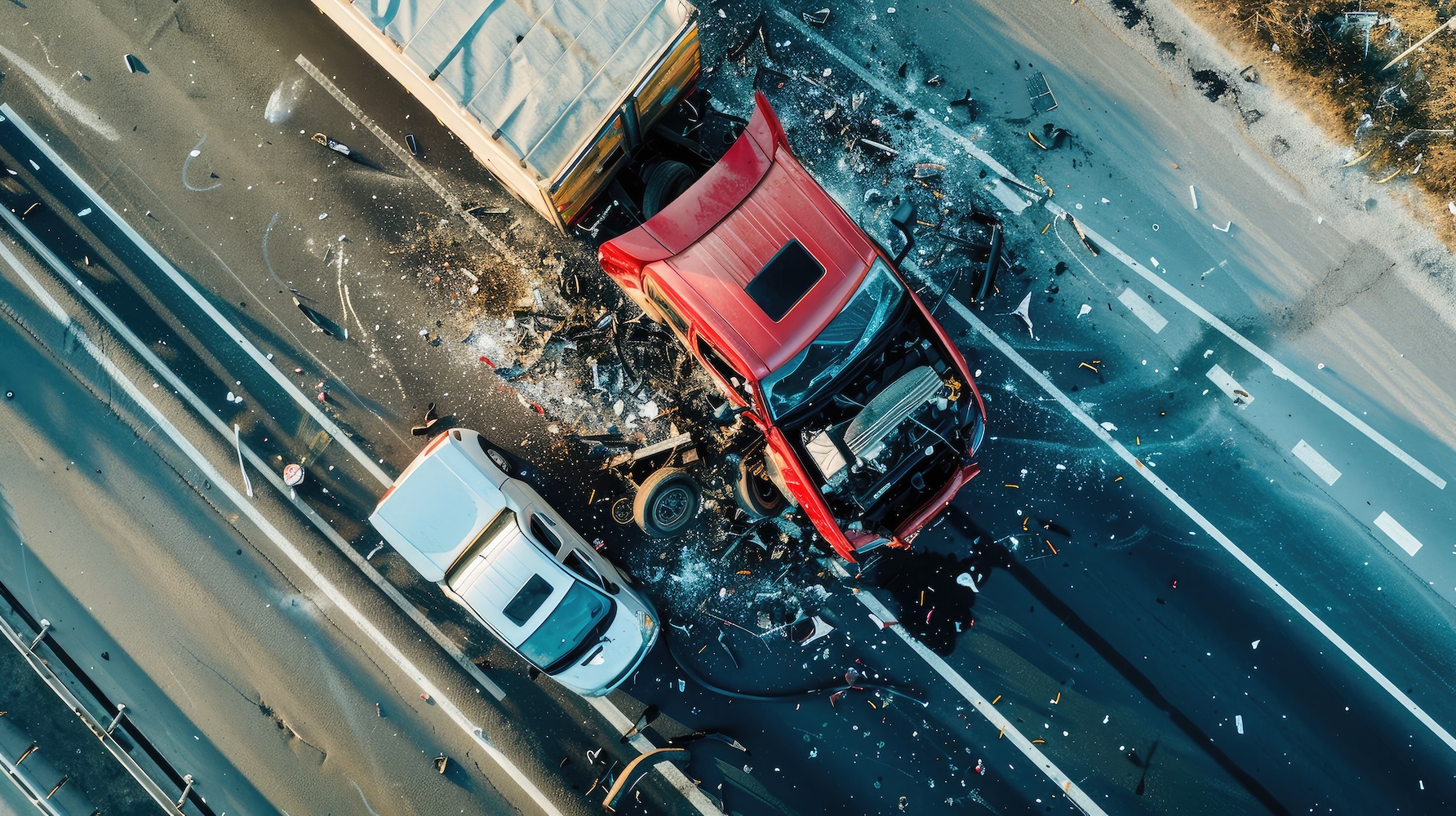When a semi-truck crashes on a Washington highway, the results are almost always serious. These vehicles can weigh up to 80,000 pounds and even a minor mistake can cause devastating harm to everyone else on the road.
At Campiche Andrews, we’ve handled many cases where a single preventable decision by a driver, a company, or a loading crew have changed someone’s life forever.
Understanding why truck accidents happen is key to proving negligence, recovering fair compensation, and preventing others from being hurt. Below, we’ll walk through the most common causes of truck accidents in Washington, what evidence we look for, and how liability often extends far beyond just the driver.
Why Truck Accidents Are So Dangerous
Truck accidents aren’t just “bigger car crashes.” They’re complex events involving multiple companies, layers of federal safety regulations, and specialized evidence such as black box data and driver logs.
A fully loaded commercial truck:
-
Takes 20–40% longer to stop than a car.
-
Has large blind spots on all sides.
-
Can jackknife or roll over if a load shifts even slightly.
-
Often travels long distances under tight delivery deadlines, creating fatigue risks.
When these factors collide, the outcome can be catastrophic including serious injuries, wrongful death, or lifelong disability.
Driver Fatigue and Hours-of-Service Violations
One of the top causes of truck crashes in Washington is driver fatigue. Truckers often face long routes, unrealistic schedules, and pressure from dispatchers to meet delivery windows.
Federal law requires rest periods under Hours-of-Service (HOS) rules, but some drivers skip or falsify them. Fatigue affects judgment, reaction time, and coordination very similar to drunk driving.
When we investigate a truck accident, our attorneys look for:
-
Electronic logging device (ELD) data showing skipped breaks.
-
Texts or dispatch messages pushing the driver to continue driving.
-
Fuel receipts or weigh-station logs that contradict the driver’s report.
If a trucking company knowingly pushed a tired driver back on the road, that’s negligence and it can form the foundation of a strong truck accident claim.
Distracted Driving and In-Cab Technology
Distraction behind the wheel is another leading cause of truck accidents. Many commercial drivers rely on phones, GPS, or onboard tablets for routing and communication but even a few seconds of lost focus can be disastrous.
Common distractions include:
-
Reading or replying to texts
-
Eating or reaching for items in the cab
-
Adjusting GPS or music
-
Talking on a cell phone without hands-free mode
At 60 mph, taking your eyes off the road for five seconds means traveling the length of a football field blind. For an 18-wheeler, that can mean the difference between braking in time or crushing a vehicle ahead.
We often use cell phone records and cab camera footage to show whether distraction played a role in the crash.
Speeding and Aggressive Driving
A heavy truck can’t stop or maneuver like a car, yet speeding and tailgating remain common among commercial drivers. Washington’s major freight routes such as I-5, I-90, and I-405 see frequent truck congestion and downhill grades that make speeding even more dangerous.
Speeding increases both crash risk and crash severity. Even five miles per hour over the limit can dramatically increase stopping distance.
Aggressive behaviors we frequently see in case files include:
-
Following too closely
-
Cutting into traffic gaps
-
Sudden lane changes without signaling
-
Failing to yield when merging
ECM (“black box”) data and traffic-camera footage often reveal a driver’s exact speed before impact. Proving these details can strengthen a serious injury or wrongful death case after a fatal truck crash.
Improper Loading and Cargo Shifts
Even the best driver can lose control of a truck that’s been loaded incorrectly. Freight must be balanced and secured to prevent shifting, especially on the steep passes and winding roads across Washington.
When a trailer is overloaded or unbalanced, it can:
-
Jackknife or tip over
-
Cause brake failure from excess weight
-
Spill cargo onto the highway, leading to multi-car collisions
In some cases, the loading company or freight broker (not just the driver) may be responsible. We investigate who handled the cargo, whether weight limits were exceeded, and whether load-securement protocols were followed.
If an improperly loaded truck caused your crash, we’ll hold every responsible party accountable because safe loading saves lives.
Mechanical Failures and Poor Maintenance
Commercial trucks log hundreds of thousands of miles per year. Without consistent inspection and repair, parts wear down and accidents become inevitable.
The most common mechanical issues we see in Washington truck crashes include:
-
Brake failure on steep grades
-
Tire blowouts from overuse or under-inflation
-
Steering or suspension problems
-
Lighting malfunctions that reduce visibility at night
Federal law requires trucking companies to maintain maintenance records, but many cut corners to save money. After a crash, our attorneys move quickly to preserve those records before they disappear.
If poor maintenance caused your accident, that’s corporate negligence and not bad luck.
Unsafe Weather and Road Conditions
Rain, fog, and ice are part of life in Washington, but commercial drivers have a legal duty to adjust to those conditions. A trucker who keeps driving full speed on I-90 during a snowstorm isn’t exercising reasonable care.
Weather-related accidents often involve:
-
Failure to slow down or pull over during heavy rain or fog
-
Hydroplaning or sliding on black ice
-
Poorly maintained tires that can’t grip wet pavement
-
Reduced visibility during early-morning or late-night runs
Truckers are trained to reduce speed or stop when the weather makes driving unsafe. When they don’t and someone gets hurt the trucking company can be held responsible for letting them continue.
Blind Spots and Unsafe Lane Changes
You’ve probably seen the warning stickers: “If you can’t see my mirrors, I can’t see you.” Those blind spots are real and they’re a major factor in collisions between trucks and smaller vehicles.
Truck blind spots extend:
-
20 feet ahead of the cab
-
30 feet behind the trailer
-
One full lane on the driver’s side
-
Two lanes on the passenger side
When a truck changes lanes or merges without double checking those zones, nearby cars can be sideswiped or run off the road.
We often reconstruct these collisions using dash cam footage, eyewitness accounts, and physical damage to show that the trucker didn’t check before merging.
Inadequate Driver Training and Oversight
Not every trucking company trains its drivers well or supervises them once they’re hired. When inexperienced drivers are sent onto Washington’s steep grades or congested highways without proper preparation, everyone pays the price.
We’ve seen crashes caused by:
-
Failure to adjust for load weight on mountain descents
-
Poor reaction during a tire blowout or skid
-
Lack of knowledge about federal regulations
-
Drivers hired despite prior safety violations
Under negligent hiring and supervision laws, a trucking company can be held liable if it failed to train or monitor its drivers. These cases often reveal broader patterns, where unsafe behavior was tolerated or even encouraged.
Company Pressure and Unrealistic Schedules
Behind many truck crashes lies a culture of “deliver or else.” Dispatchers and managers often impose tight schedules that leave no room for rest, maintenance, or bad weather.
That pressure can push drivers to:
-
Ignore fatigue
-
Skip inspections
-
Speed through construction zones
-
Drive longer than legally allowed
When companies reward risky behavior with bonuses or promotions, it’s not just unfair, it’s reckless. Our attorneys use internal emails, dispatch logs, and pay structures to prove that a company’s own system encouraged dangerous driving.
Holding trucking companies accountable helps make Washington roads safer for everyone.
Multiple Causes Colliding
In reality, most truck crashes involve several factors working together. A fatigued driver speeding down a wet hill with an overloaded trailer and that’s a perfect storm.
When multiple failures overlap, determining liability becomes complex. That’s where experienced attorneys matter most. At Campiche Andrews, we bring in accident reconstruction experts, engineers, and federal-regulation specialists to piece together what happened and who’s truly responsible.
The more we uncover, the stronger your case becomes and the clearer the story we can tell to a jury or insurer.
How Our Attorneys Prove the Cause of a Truck Accident
Proving negligence in a truck crash isn’t about guesswork—it’s about evidence. Our team collects and preserves every possible record, including:
-
Electronic logging device (ELD) and black box data showing speed, braking, and driving hours.
-
Maintenance and inspection logs from the trucking company.
-
Driver qualification files and prior violation reports.
-
Dash-cam, surveillance, or traffic-camera footage.
-
Cell-phone records and dispatch communications.
-
Cargo manifests and weight tickets.
This detailed approach has helped our firm recover millions for injured clients in serious injury and wrongful death cases across Washington.
Common Injuries from Truck Crashes
The sheer force of a truck impact often leads to catastrophic injuries, including:
-
Traumatic brain injuries (TBI)
-
Spinal cord damage and paralysis
-
Multiple fractures
-
Internal bleeding or organ damage
-
Burns from fuel or cargo fires
-
Fatal injuries leading to wrongful death claims
If you or a loved one suffered one of these injuries in a trucking accident, you may be entitled to compensation for medical costs, lost wages, and long-term care.
What to Do After a Truck Accident in Washington
Your actions immediately after a crash can make or break your case. Here’s what our lawyers recommend:
-
Call 911 and get medical help right away, even if you feel okay.
-
Document the scene. Take photos of vehicles, skid marks, and cargo spills.
-
Exchange information with the driver and note the company name, license plate, and USDOT number.
-
Avoid speaking to insurance adjusters until you’ve talked to a lawyer.
-
Contact an experienced Seattle truck accident lawyer as soon as possible to preserve evidence before it disappears.
You can start by scheduling a free case review with our team. We’ll walk you through your rights and what steps to take next.
Who Can Be Held Liable After a Truck Accident?
Truck accidents are rarely the fault of just one person. Depending on the evidence, liability may extend to:
-
The truck driver (for speeding, fatigue, or distraction)
-
The trucking company (for negligent hiring or scheduling)
-
The loading company (for cargo errors)
-
The maintenance contractor (for mechanical failure)
-
The truck manufacturer (for defective parts)
Learn more about liability in our post Who Is Liable in a Seattle Trucking Accident?
When multiple parties share responsibility, our attorneys pursue every avenue to maximize your recovery.
How Compensation Works in Washington
In Washington, truck accident victims can seek compensation for:
-
Medical bills and rehabilitation
-
Lost wages and reduced earning capacity
-
Pain and suffering
-
Emotional distress
-
Property damage
-
Wrongful death damages for surviving family members
Even if you’re partially at fault, you may still recover compensation under Washington’s comparative fault law. Learn more in our post What Happens If I’m Partially at Fault in a Car Accident in Washington?
Local Risks Across Washington
Certain parts of Washington see more truck traffic and, therefore, more risk:
-
I-5 corridor from Seattle to Tacoma: constant freight congestion and lane merging.
-
Snoqualmie Pass on I-90: steep grades and frequent snow or ice.
-
Port of Tacoma and Seattle industrial areas: tight turns, frequent loading/unloading.
-
US-2 and Highway 18: two-lane routes with limited visibility and heavy logging trucks.
Our firm represents clients statewide from Seattle and Tacoma to Spokane, Olympia, and beyond.
How Campiche Andrews Helps Victims of Truck Crashes
Truck accident cases require deep legal and technical experience. Our attorneys understand federal trucking regulations, evidence preservation, and the insurance tactics used to avoid paying fair claims.
When you hire our firm, we:
-
Launch a rapid investigation to secure evidence.
-
Work with reconstruction experts to determine fault.
-
Handle communication with insurers so you can focus on recovery.
-
Negotiate aggressively—and take your case to trial if needed.
Visit our Truck Accident Attorney page to learn more about our experience and recent case results.
Preventing Future Truck Crashes
While our focus is helping victims, prevention matters too. Safer trucking practices protect everyone on the road.
Trucking companies should:
-
Enforce realistic schedules.
-
Maintain vehicles regularly.
-
Train drivers thoroughly before sending them on steep or urban routes.
-
Use technology like lane-departure and fatigue-monitoring systems.
Drivers should:
-
Rest when tired.
-
Avoid distractions.
-
Reduce speed in rain, fog, or heavy traffic.
And motorists can help by avoiding blind spots and giving large trucks extra space.
When to Call a Truck Accident Lawyer
The trucking company’s insurance team will act fast to protect its bottom line—often within hours of a crash. Victims deserve the same urgency.
Contact a Seattle truck accident attorney as soon as possible after an accident. The earlier your legal team gets involved, the better the chance of preserving evidence and building a strong claim.
Talk to Campiche Andrews About Your Case
If you or a loved one was hurt in a truck accident anywhere in Washington, you don’t have to face the aftermath alone. The attorneys at Campiche Andrews have decades of experience representing injured people and families in serious injury and wrongful death cases.
We know how to take on powerful trucking and insurance companies and win.
Schedule your free case review today or call us directly. We’ll listen to your story, explain your options, and help you pursue the justice and compensation you deserve.
People Also Ask
What are the most common causes of truck accidents in Washington?
The most common causes include driver fatigue, distracted driving, speeding, improper cargo loading, and poor vehicle maintenance. Washington’s steep highways and wet weather can make these problems even more dangerous. Learn more about how these issues cause serious crashes on our Truck Accident Attorney page.
Who can be held liable after a semi-truck crash?
Liability often extends beyond the driver to include the trucking company, cargo loaders, maintenance contractors, or even parts manufacturers. Each has legal duties to keep trucks safe and operated within federal regulations. We explain this in detail in Who Is Liable in a Seattle Trucking Accident?
How long do I have to file a truck accident claim in Washington?
You generally have three years from the date of the crash to file a personal injury lawsuit in Washington. Acting quickly helps preserve critical evidence such as black box data, driver logs, and maintenance records. If you’re unsure about deadlines, request a free case review.
What evidence proves the cause of a truck accident?
Evidence can include black box data, driver logs, maintenance records, cargo manifests, and photos or videos from the crash scene. This data helps show exactly what went wrong and who’s at fault. Our legal team outlines this process on our Truck Accident Attorney page.
What if I was partially at fault for the truck accident?
Washington uses comparative fault, which means you can still recover damages even if you were partly to blame. Your compensation is reduced by your percentage of fault. Read more about this in What Happens If I’m Partially at Fault in a Car Accident in Washington?
How are truck accidents different from car accidents?
Truck crashes involve far more complexity—federal safety rules, multiple liable companies, and higher insurance limits. The injuries are also usually more severe because of the truck’s size and weight. Our Seattle Truck Accident Lawyer page explains why these cases require specialized legal help.
Should I talk to the trucking company’s insurer after the crash?
It’s best to speak with a lawyer first. Insurance adjusters are trained to limit payouts and may try to get statements that weaken your claim. Our attorneys handle all communication after you request a free case review.
Do I need a Seattle truck accident lawyer or can I handle the claim myself?
Truck accident cases are complex, involving federal safety rules, multiple companies, and commercial insurance carriers. A skilled attorney can investigate, gather evidence, and negotiate for the full value of your claim while you focus on healing.
Call Our Seattle Truck Accident Attorneys Today
If you or a loved one has been injured in a truck accident, don’t wait for the trucking company to get the upper hand.
Call (206) 281-9000 or request your free case review today.
At Campiche Andrews, we fight for the justice and compensation you deserve.





